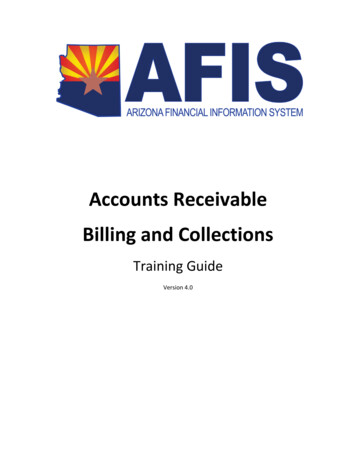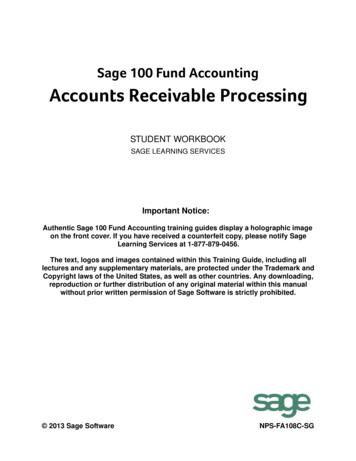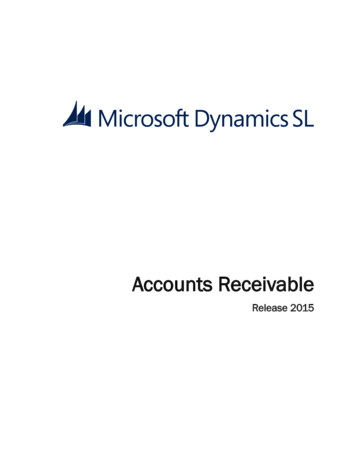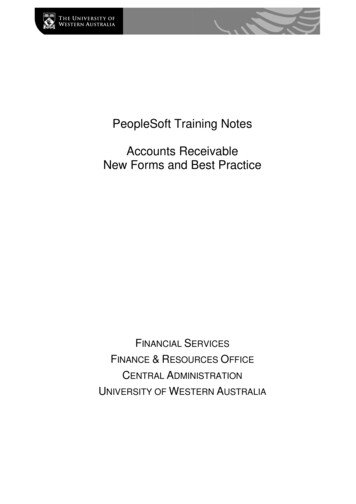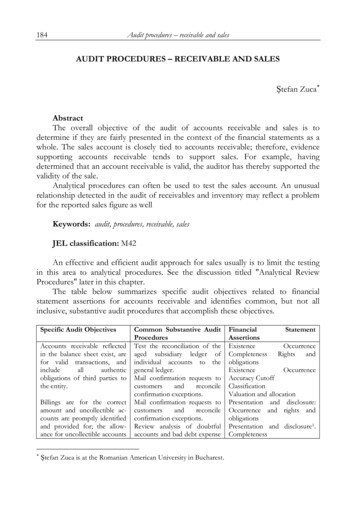
Transcription
ADS Chapter 625Accounts Receivable and Debt CollectionPartial Revision Date: 11/24/2020Responsible Office: M/CFO/FPSFile Name: 625 112420
11/24/2020 Partial RevisionFunctional Series 600 – Budget and FinanceADS 625 – Accounts Receivable and Debt CollectionPOC for ADS 625: Francisco Ramos, framoshilerio@usaid.govTable of Contents625.1OVERVIEW . 4625.2PRIMARY RESPONSIBILITIES . 4625.3POLICY DIRECTIVES AND REQUIRED PROCEDURES . 8625.3.1Financial Documentation Responsibilities . 8625.3.2625.3.2.1625.3.2.2Debt Collection . 9General Debt Collection Requirements. 9Federal Claims Collection Standards (FCCS) . vables . 11Recognition of Receivables . 11Billing Activity . 12Electronic Paper Check Conversion . 13Statute of Limitation for Claims . tion of Claims . 16Claims Originating Under Acquisition and Assistance Instruments . 16Claims Originating Under Financial Audit . 17Training for Development – Non Returnees Claims . 17Title II Claims . 19Employee Claims . 19Informal Billing Procedures . 22Claims Involving Criminal Activities or Misconduct . 22Claim Satisfaction . 23Handling Disputes for All Claims Other Than Claims Arising UnderAcquisition and Assistance Instruments and Employee Claims . 24Charges for Late Payments, Interest, Penalty, and Administrative Cost . 25Recognition of Delinquent Receivables and Losses due to UncollectibleAmounts. tus of Claims and Receivables . 27Compromise, Suspension, or Termination of Collection, Write-off, andDischarge and Close-out of Debt . 28Debtor Bankruptcy Protection . 31625.3.6Billing Office Records . 32Text highlighted in yellow indicates that the adjacent material is new or substantively revised.ADS Chapter 6252
11/24/2020 Partial Revision625.3.6.1625.3.6.2Debt Administrative File . 33Debt Administrative File for Mission Transfer of Debts to M/CFO/WFS . 34625.3.7Separate Reporting of Receivables . 35625.3.8625.3.8.1Receivables . 35Reconciliation and Reporting . 35625.3.9625.3.9.1625.3.9.2Automatic Transfer to Treasury for Continued Collection . 37Treasury Debt Collection Services . 37Eligible Debt for Transferring to Treasury . 39625.3.10Subsequent Demands for Payment – Non-TIN Debts . 39625.3.11Installment Payments . 40625.3.12Referrals to the Department of Justice . 40625.4MANDATORY REFERENCES . 41625.4.1External Mandatory References . 41625.4.2Internal Mandatory References . 42625.4.3Mandatory Forms . 42625.5ADDITIONAL HELP . 42625.5.1Optional Forms . 42625.6DEFINITIONS . 43Text highlighted in yellow indicates that the adjacent material is new or substantively revised.ADS Chapter 6253
11/24/2020 Partial RevisionADS 625 – Accounts Receivable and Debt Collection625.1OVERVIEWEffective Date: 09/09/2008This ADS chapter describes the Agency’s policy directives and required proceduresunder title 31 United States Code authorities. The standards and guidelines are in theadministrative regulations of 22 CFR 213. Additional requirements are located in theUnited States Department of the Treasury’s (Treasury) standards to effectively manageagency accounts receivable debts, exclusive of loan and loan guarantees. ADS Chapter625 discusses commercial and employee debts owed to the Agency. For administrationof USAID credit programs, see ADS 623, Financial Management of Credit Programs.The material in this chapter includes Debt determinations; Recognition of debts; Proper billing methods, termination, suspension, and write-off of uncollectibleaccounts; and Routine servicing of the Agency’s accounts receivables. This service includesinformation on recording the debt in the Agency’s accounts, estimating baddebts, and external reporting of the Agency’s accounts receivable.The principles described in this chapter are in accordance with all applicable statutoryauthorities under the law (see 31 U.S.C 3701), U.S. Treasury standards (see ManagingFederal Receivables), and Agency administrative regulations (see 22 CFR 213).The three principle authorities USAID adheres to for USAID policy directives and thecollection of debts owed to the Agency are the Debt Collection Improvement Act of1996 (DCIA), Federal Claims Collection Standards (FCCS), and 22 CFR 213 . TheU.S. Treasury’s document, Managing Federal Receivables, is used as a continualreference throughout this chapter, when applicable to USAID, as implementingguidance.625.2PRIMARY RESPONSIBILITIESEffective Date: 11/24/2020a.The Chief Financial Officer (CFO): Develops, issues, and implements the Agency’s policy directives and requiredprocedures for managing Accounts Receivables. The policy directives formanaging accounts receivable are in conformance with applicable statutes undertitle 31 U.S.C., administrative regulations under title 22 of the Code of FederalText highlighted in yellow indicates that the adjacent material is new or substantively revised.ADS Chapter 6254
11/24/2020 Partial RevisionRegulations, and United States Department of the Treasury (Treasury) policystandards and principals for non-Federal debts. Is the final appeals authority for employee waiver requests for overpayments ofsalary and benefits. Determines the enforceability of collection actions on all debts owed to theAgency and writes off accounts determined to be uncollectible.b.The Chief, Office of the Chief Financial Officer, Washington FinancialServices (M/CFO/WFS): Manages USAID/Washington (USAID/W) billing functions and activities,oversees the establishment and maintenance of accounting procedures, andcontrols related to USAID/W billings. Advises Mission Controllers on the proper measurement and valuation ofreceivables (see 625.3.5.1). Reviews the facts involving waiver requests for employee indebtedness (see625.3.4.5). Signs the annual letter of agreement with Treasury detailing the terms for thecross-servicing arrangement between the Agency and Treasury for centralizedcollection options (see 625.3.9.1a). Is the official billing office for demand letters prepared by Contracting Officials(see 625.3.4.1). Refers delinquent accounts to the Treasury for Collection (see 625.3.9). Is the official billing office including preparation of other demand repaymentletters (see 625.3.4.3). Monitors and tracks delinquent debt (see 625.3.8.1). Is delegated by the CFO the authority to:-Approve and process the removal of uncollectible accounts (see 625.3.5.1).Approve final closeouts that result in the termination of all collection activity(see 625.3.5.1).c.The Chief, Bureau for Management, Office of the Chief Financial Officer,Payroll Division (M/CFO/P):Text highlighted in yellow indicates that the adjacent material is new or substantively revised.ADS Chapter 6255
11/24/2020 Partial Revision Serves as the interface in the National Finance Center (NFC) billings for U.S.Direct-Hire (USDH) employee payroll-related indebtedness, and Tracks and monitors employee debt (see 625.3.4.5).d.Mission Directors: The CFO delegates (see ADS 103.3.8.5) to Mission Directors and other PrincipalOfficers at USAID field posts the authority to compromise or suspend collectionaction on non-taxpayer identification number (non-TIN) debts that do not exceed 25,000 of the principal balance (excluding interest, penalties, and administrativecosts). Debts may not be subdivided to avoid the 25,000 limit on the CFO’sdelegated authority to compromise or suspend collection action on a debt. The delegated authority allowed above does not include the indebtedness ofUSDH employees. The delegated authority allowed does not include debts that appear to befraudulent, false, or misrepresented by a party having an interest in the debt. Insuch cases, the CFO will refer these claims to the USAID Office of InspectorGeneral (OIG). When functioning as a Contracting Officer (CO) or Agreement Officer (AO), theMission Director determines the amount of debt under a contract or assistanceinstrument, based on the authority inherent in the role of a CO or AO, withincontracting authority limits.e.The Contracting Officer or Agreement Officer determines the amount of debtto be recovered under an acquisition or assistance instrument (see 625.3.4.1).f.Food for Peace Officers (USAID officials responsible for managing theimplementation of Title II Programs and activities): Monitor lost or damaged commodities or other circumstances that give rise toAgency claims, and Maintain follow-up files on third party claims that could result in a USAIDreceivable (see 625.3.4.4).g.Sponsoring Unit Activity Manager for Participant Training determineswhether the participant is a non-returnee and notifies the Chief, Economic Growth,Education and Environment, Office of Education (E3/ED) (see 625.3.4.3).h.The Chief, Economic Growth, Education and Environment (E3/ED):Text highlighted in yellow indicates that the adjacent material is new or substantively revised.ADS Chapter 6256
11/24/2020 Partial Revision Determines the amount of debt to be recovered for a centrally funded andmanaged non-returnee participant trainee. Notifies M/CFO/WFS to issue the Demand Notice for repayment.i.The Mission or Regional Controller: Designates Mission billing offices and oversees the establishment andmaintenance of accounting procedures and records controlling the amounts ofMission billings; Transfers delinquent Taxpayer Identification Number (TIN) debts equal to orgreater than 500, other than USDH employee debt, to M/CFO/WFS; Transfers eligible USDH employee delinquent debt to the Bureau forManagement, Office of the Chief Financial Officer, Payroll Division (M/CFO/P)(see 625.3.4.5); Transfers eligible delinquent non-TIN debts to M/CFO/WFS (see 625.3.6.1); Issues the Demand for Training Repayment Letter to non-returnee participanttrainees; and Serves as the Mission billing office for billing documents prepared at the Mission.(see 625.3.3.2).j.Executive Officers (EXOs) and other management officials: Serve as billing officers in some locations for both informal and formal bills. Notify the appropriate USAID billing office of any indebtedness by employees fornonofficial use of vehicles, telephones, faxes, lost or damaged property, etc. inlocations where the Executive Office is not designated as a billing office.k.The Billing Office: The Mission or regional CO or AO is the designated billing support office for debtdetermination and issuance of the demand letter for collection. Demand lettersare issued to contractors or assistance agreement recipients. When the Mission or regional CO or AO issues the final debt determination, theMission or Regional Controller becomes the designated billing office. That billingoffice is responsible for collection follow up and formally recording the receivablein Phoenix.Text highlighted in yellow indicates that the adjacent material is new or substantively revised.ADS Chapter 6257
11/24/2020 Partial Revision M/CFO/WFS is the designated USAID/W billing office for creating the formal billfor collection for recording the receivable in Phoenix and for use in collectionenforcement activities. M/CFO/WFS bases the bills for collection on the demandletters issued by M/OAA to contractors or recipients. When designated by the Mission or Regional Controller, the EXO acts as thebilling office when issuing formal and informal billings for claims concerningemployee indebtedness incurred at Missions. When required, the USAID/W billing office prepares and issues billings thatcomply with the policy standards expressed in this chapter and must maintain theadministrative case file for the debt. When a USAID/W cognizant independent office, bureau Controller, orAdministrative Services office prepares the billing/notification letter outside of theM/CFO or the Mission Controller’s office, that office is responsible forestablishing the accounts receivable with M/CFO/WFS. Aggressively pursues debts that are not eligible for transfer to Treasury forcentralized collection services (see 625.3.9.1c). Prepares the required reports for the effective management of USAID’s collectionprogram. When located in missions, provides support to the Mission Controller in transferand termination of collection activity. The billing office must prepare necessarydocumentation and computations required for transfer or termination (see theMission Controller responsibilities).625.3POLICY DIRECTIVES AND REQUIRED PROCEDURES625.3.1Financial Documentation ResponsibilitiesEffective Date: 06/30/2003Financial documentation is any documentation that impacts or results in financialactivity. It is not limited to documentation within the Controllers’ or Chief FinancialOfficer (CFO) operations but includes any source material causing or resulting in afinancial transaction. Contracting Officers Representatives (CORs), Loans/GrantsOfficers, Development Objective (DO) teams, etc. are responsible for retaining financialdocumentation and ensuring its availability for audit.Basic financial documentation retention rules: If an action will result in a financial transaction, it must be documented;Text highlighted in yellow indicates that the adjacent material is new or substantively revised.ADS Chapter 6258
11/24/2020 Partial Revision Source documentation must be readily available for audit by the Office ofInspector General (OIG) or a responsible audit entity; and The general rule of thumb for retention of financial documents is seven years;however, retention times may vary, so please refer to retention by document typein ADS 502, The USAID Records Management Program. The specificfinancial Records Disposition Schedules are located in the Mandatory ReferenceSection of ADS 502, under Records Disposition Schedule, USAID/W, Chapter15, Fiscal Management Records; and Records Disposition Schedule, USAID,Chapter 35, Financial Management Records. Also, see the National Archivesand Records Administration (NARA) General Records Schedules, GRS 6,Accountable Officers’ Account Records; and GRS 7, Expenditure AccountingRecords.625.3.2Debt CollectionEffective Date: 11/17/2011Debt collection describes the efforts to recover amounts due after the debtor fails tomake payment. This activity includes assessing the debtor’s ability to pay, discussingpossible alternative arrangements to increase the debtor’s ability to repay, andinvestigating other efforts to secure payment.625.3.2.1General Debt Collection RequirementsEffective Date: 11/24/2020Debt Collection Improvement ActThe Debt Collection Improvement Act of 1996 (DCIA) mandated centralizedgovernment debt collection activities and standardized many of the processes andavailable collection practices. The purpose of the DCIA was to reduce losses from baddebts, require the delinquent debtor to assume more of the collection costs, andimprove financial information.The DCIA requires that during the initial payment period (generally the first 30 daysunless otherwise stated) and the initial 60 days of the delinquency period, debtcollection efforts must provide for timely, forceful, and efficient action to collect from theindividual payee, recipient, or other person or entity legally liable for payment of thedebt.The Department of the Treasury (Treasury)Collection of foreign non-Taxpayer Identification Number (non-TIN) debts by USAID ispreferable to transferring those types of debts to Treasury for cross-servicing.Transferring non-TIN foreign debts to Treasury usually results in a write-off becausemany of the collection tools used by Treasury and private collection agencies operatewith the use of the TIN. TINs and the use of private collection agencies are seriouslylimited in overseas locations involving foreign debtors.Text highlighted in yellow indicates that the adjacent material is new or substantively revised.ADS Chapter 6259
11/24/2020 Partial RevisionUSAID uses Treasury’s centralized collection services aggressively when possible.USAID must recover all interest, penalties, and additional fees incurred through theTreasury collection process.Mission DirectorsWhile Mission Directors have delegated authority from the CFO to compromise orsuspend collection action on non-TIN debts that do not exceed 25,000 of the principalbalance (excluding interest, penalties, and administrative costs), all eligible debts over 500 with TIN numbers are transferred to M/CFO/WFS for referral to Treasury within 60days after the date the debt becomes delinquent. Eligible debts without TIN numbersare forwarded 90 days after they become delinquent.Billing OfficesAll efforts by Billing Offices and others involved in managing accounts receivable mustbe designed to lead to the quickest practicable conclusion of administrative effort toeffect collection. This includes ensuring that the required due process requirements aremet by including them in the initial demand notice, a Demand Letter or Bill forCollection (BFC). Due process notification, consisting of the debtors rights to disputethe debt, must be made when the debt becomes delinquent. The due processnotification in the initial demand letter or BFC facilitates a proper billing and avoids anydelays in collection due to an incomplete billing.The Billing Office must coordinate with the Contracting Officer (CO) or AgreementOfficer (AO) on collection actions related to claims that originate under acquisition orassistance instruments. The policies and procedures for issuing and collecting claimsdue from employees and other debtors are included in 22 CFR 213.The Billing Office must ensure that collection and deposit of funds are made byM/CFO/WFS or cashier offices at overseas locations in a timely manner. Collectionsand deposits must be made in a way that is most advantageous to the government.Collection by Electronic Funds Transfer (EFT) or through the Automated ClearingHouse (ACH) is the preferred method of receiving funds. When a collection item cannotbe identified by the cashier, the deposit must be made to 72F3875, A.I.D. BudgetClearing Account (Suspense). Any deposit to this account must be cleared within 30days of the deposit.625.3.2.2Federal Claims Collection Standards (FCCS)Effective Date: 07/27/2006The authority for the Federal Claims Collection Standards (FCCS) is authorized under31 USC 3711, and the standards and prescribed methods are codified under 31 CFR900-904. USAID claims collection regulations are included in 22 CFR 213. Theregulations cover all aspects of administrative collection, including proper due processnotification to debtors, offset, compromise, and suspension or termination of collectionactivity by USAID.Text highlighted in yellow indicates that the adjacent material is new or substantively revised.ADS Chapter 62510
11/24/2020 Partial RevisionWhen a debt in excess of 100,000 has been referred to M/CFO/WFS for collection,and The debt is appropriate for transfer to Treasury for cross-servicing under theTreasury Offset Program (TOPS), The debt has been transferred for collection, Treasury has determined that it is not collectible, Treasury forwarded the debt (at the Agency’s request) to the Department ofJustice (DOJ) for approval to write-off, and DOJ approves the write-off, thenThe status is changed to “terminate active collection” and M/CFO/WFS writes the debtoff its accounting records.If the debt does not qualify for transfer to Treasury for cross-servicing or TOPS (forexample: employee debt), then M/CFO/WFS uses the same step to obtain approvalitself, without Treasury’s assistance. This includes processing through DOJ if theamount of the debt requires it. If DOJ approves termination of collection which wouldresult in the write-off of the associated amounts (interest, penalty, etc.), the requirementto send the debt to DOJ is based only on the amount of the principal and does notinclude the additional items of interest, penalty, etc.625.3.3ReceivablesEffective Date: 07/27/2006A receivable is an amount owed USAID by an individual, organization, or other entity tosatisfy a debt or claim. Examples of some receivables generated by USAID activitiesinclude: Amounts due for disallowed cost under contracts, including recoveries ofoverpayments, Amounts due for goods or services, and Overpayments of salaries and benefits.625.3.3.1Recognition of ReceivablesEffective Date: 09/09/2008Cognizant Bureaus/Independent Offices (B/IOs) or Missions may recognizeindebtedness to USAID and will promptly notify M/CFO/WFS or the Mission Controllerto issue a bill for collection. For debts that arise under contracts or assistanceinstruments, it is the CO or AO that is solely responsible for making a debtText highlighted in yellow indicates that the adjacent material is new or substantively revised.ADS Chapter 62511
11/24/2020 Partial Revisiondetermination. (See Federal Acquisition Regulation, Contract Debts Subpart 32.6.)The CO or AO must evaluate the propriety nature of the charges and make anassessment of any disallowed portion. When the CO or AO makes a final determinationthat disallows a portion of the cost, the CO or AO must issue a demand letter to thecontractor or assistance agreement recipient and notify M/CFO/WFS or the MissionController. After the CO or AO makes a final debt determination, M/CFO/WFS andMission Controllers recognize the receivables and record them in Phoenix. All billingoffices must establish procedures to bill and collect amounts due as quickly andefficiently as possible. Generally, a Demand Notice (these may take the form of a Billfor Collection, Demand Notification Letter issued by the CO or AO for contracts orassistance instruments, or other Bills for Collection issued by a designated billingoffice, see http://www.usaid.gov/forms) is the documentation used to establish areceivable.After receiving notification that indebtedness exists, M/CFO/WFS must record thereceivable within five working days.M/CFO must not record a receivable if it Has no merit. A debt has no merit if it was never owed or if it originally shouldnot have been classified as a debt. Recording of debts without merit on thebooks of the Agency falsifies the financial position of the Agency. Undercontracts and assistance instruments, it is the CO or AO that must determinemerit. Merit is based strictly on substantiation of disallowed cost under contractsor assistance instruments. The substantiation of the disallowed cost must beevidenced by supporting documentation necessary to validate the debt. Merit isnot based on the ability to collect the debt. M/CFO is solely responsible for theassessment of the Agency’s ability to collect the debt and the collection efforts. Is unenforceable. A debt is unenforceable and uncollectible when it cannot beenforced in a court of law, for example, (1) expiration of the statute of limitations(SOL) for the particular claim or (2) the due process rules under debtors rightswere inadequately applied by the cognizant billing office. M/CFO is responsiblefor determination of the unenforceability of debt collection and must move towrite-off, compromise, suspend, or terminate active collection action whenaccounts cannot be collected. M/CFO must consult the Office of GeneralCounsel (GC) to substantiate the validity of an unenforceable claim.If a payment date is not designated, receivables remain in a non-delinquent, currentstatus up to the payment date that is either specified in the Demand Notice or 30calendar days from the date of the Demand Notice. The receivable becomes delinquentthe day after the payment due date on the bill or 31 calendars days from the date ofnotice; then it is subject to the Debt Collection enforcement process. (See 625.3.7.)625.3.3.2Billing ActivityEffective Date: 07/27/2006Text highlighted in yellow indicates that the adjacent material is new or substantively revised.ADS Chapter 62512
11/24/2020 Partial RevisionAll billing activity must be billed and recorded the Phoenix accounts receivable recordswithin five working days of the event or discovery of the event that gives rise to thedebt. The informal billing activity is an exception (see 625.3.4.6) to this rule. TheMission or Regional Controller is responsible for issuing and recording Bill forCollections and all subsequent related transactions–interest accumulation, compromise,write-off–where applicable in Phoenix or forwarding the Bill for Collection toM/CFO/WFS. Form AID 7-129, Bill for Collection, is no longer the only authorizedbilling document. USAID billing offices use the negotiated settlement or the finalsettlement letter issued by CO’s or AO’s as the support billing documentation toestablish a debt due from a contractor or grantee. The bill for collection or demandletter is dated by the CO or AO with the date on which it is mailed, hand-delivered, orotherwise transmitted to the debtor. (See Bill for Collection Demand Letter.) Forbilling documents prepared outside of CFO activities, such as demand letters, seeAAPD 03-07, Instructions to Contracting/Agreement Officers on their Role in theDebt Collection Process.A CO or AO who prepares a letter that informs contractors or recipients of a debtdetermination and uses a form and content outside the prescribed Bill for CollectionDemand Letter must ensure that their letter includes all requisite due processnotification. (See 22 CFR 213.9, Written notice.) A proper written notice ensures theAgency has a legally enforceable debt. The Billing Office must record the receivable inthe appropriation or fund that will be credited when collections are complete.Management decisions on questioned cost under contracts or grants provide the basisand documentary evidence for establishment of accounts receivable related to auditrecommendations. (Refer to ADS 595, Audit Management Program, paragraph595.3.1.3.)The initial bill for collection or demand letter must include the appropriate informationand due process procedures, see 22 CFR 213, Section 213.9, Written notice.NOTE: For TIN debt, if the initial billing carries the required due processinformation, no further follow-up is required prior to transferring the debt toTreasury for cross-servicing/TOPS.625.3.3.3Electronic Paper Check ConversionEffective Date: 05/11/2007The debtor may make the payment electronically (preferred method) or by check.Paper checks received in USAID/Washington or at overseas posts will be treated as anElectronic Paper Check Conversion – Over the Counter (PPC/OTC) transactions.Electronic Paper Check Conversion Allows paper checks to be scanned and converted into an electronic facsimile, Strips the account and payment information from the document,Text highlighted in yellow indicates that the adjacent material is new or substantively revised.ADS Chapter 62513
11/24/2020 Partial Revision Transmits the transaction data to the Federal Reserve Bank (FRB) for electronicfunds transfer (EFT), and Eliminates the need to send the check to the bank for processing.Electronic Paper Check Conversions are scanned and converted through the U.S.Treasury Automated Clearing House (ACH) system and pr
accounts; and Routine servicing of the Agency's accounts receivables. This service includes information on recording the debt in the Agency's accounts, estimating bad debts, and external reporting of the Agency's accounts receivable. The principles described in this chapter are in accordance with all applicable statutory


